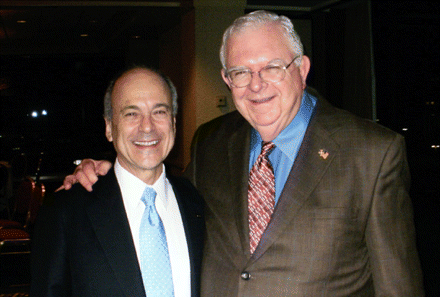Steven Sharfstein, M.D., has been named the AMA's Non-Trustee Commissioner to the Joint Commission's Board of Commissioners.
An independent, not-for-profit organization, the Joint Commission accredits and certifies more than 18,000 health care organizations and programs in the United States. Joint Commission accreditation and certification are recognized nationwide as symbols of quality that reflect an organization's commitment to meeting certain performance standards.
Sharfstein, who is president and CEO of the Sheppard Pratt Health System in Baltimore and a past president of APA, is replacing Joseph T. English, M.D.—also a past president of APA—who is retiring from the Joint Commission as the AMA's non-trustee commissioner. The Board of Commissioners, the Joint Commission's governing body, consists of 29 voting members with diverse experience in health care, business, and public policy; seven of those are physicians appointed by the AMA.
Sharfstein will serve for a three-year term, after which he may be re-appointed for up to two additional three-year terms.
"My focus will be on quality of care for patients with serious and persistent mental illness," Sharfstein told Psychiatric News. "With Dr. English stepping down, I am the only psychiatrist on the Board of Commissioners, and the AMA wanted to have someone with expertise in the care of the mentally ill. The Joint Commission accredits a variety of behavioral health entities in addition to psychiatric and general hospitals."
In a statement following the appointment, APA Medical Director James H. Scully Jr., M.D., said that Sharfstein's 25-years' experience leading a major psychiatric hospital will serve him well on the Joint Commission.
"His experience makes him an ideal member of the Board of Commissioners to help lead the way in maintaining and improving health care quality in the face of changes related to health care reform," Scully said.
English is stepping down from the Joint Commission's board after three consecutive three-year terms. In an interview with Psychiatric News, he credited his tenure on the board—and the appointment of Sharfstein by the AMA—to the relationship that APA has built with the AMA over nearly a decade, particularly in the AMA's House of Delegates.
English told Psychiatric News that in 2002 when he was chair of the AMA Section Council on Psychiatry, APA pledged to make itself the "model membership association working with the AMA." APA waged a campaign to increase the number of APA members who were also AMA members to over 10,000, allowing for an expansion of psychiatry's delegation on the floor of the House of Delegates from one delegate and one alternate to seven delegates and seven alternates.
The Section Council on Psychiatry now has delegates sitting on many of the AMA's councils, and psychiatrist Jeremy Lazarus, M.D., who has served as speaker of the House of Delegates and is a former speaker of the APA Assembly, will be running for president-elect of the AMA this year. In addition, psychiatrist Patrice Harris, M.D., of Atlanta is seeking a seat on the AMA Board of Trustees, and past APA President John McIntyre, M.D., is running for re-election to the AMA's Council on Medical Services.
English said the appointment of a psychiatrist to the board of the Joint Commission is the fruit of the success of the Section Council on Psychiatry within the House of Delegates.
"These things don't just happen but grow out of a network of relationships that have been nurtured over a period of years," he said.
The mission of the Joint Commission is to continuously improve health care for the public, in collaboration with other stakeholders, by evaluating health care organizations and inspiring them to excel in providing safe and effective care of the highest quality and value. Joint Commission accreditation can be earned by an entire health care organization such as a hospital or nursing home; programs and services within or associated with a health care organization—such as special programs for diabetes or depression care—can also earn accreditation.


